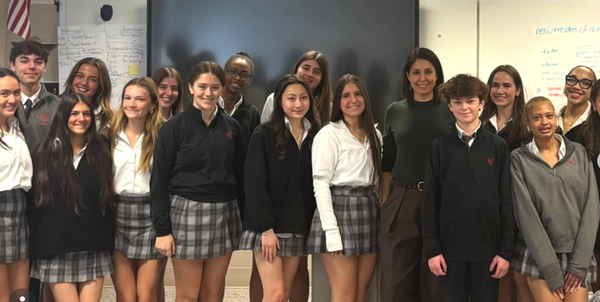Senior Advice: College application tips

Applying to college next year? Here are five recommendations based on my own college application experience to help make the application process smoother:
1) Begin working on your personal statement early
The Common Application Essay: the most feared 650-word essay of my life. As my senior year approached, I worried about how to write this essay. How would I come up with an idea or story that would allow me to explain who I was and show how I was a qualified candidate for admission?
After a lot of thinking and reflection, I realized that I didn’t have to try to seem interesting, that worrying about perfection is just an impediment to getting things done, and that I had plenty of stories I could tell. The good news for you is that you have a story to tell, too – just force yourself to start writing!
I wrote and finished my first draft during the summer, which gave me more time to reflect on what I was writing and allowed me to focus on other parts of my applications during the school year. It also gave me a chance to seek advice and feedback from people who I knew could offer a valuable perspective. Start writing early and you’ll be thankful.
2) Don’t forget about supplemental essays
Yes, there are more essays! Many universities require additional, often shorter essays that give you a chance to present a more nuanced and holistic image of yourself. These range from “why” essays meant to gauge your interest in a particular college or major to unique or open-ended questions that prompt you to show the way you think and relate it to your previous experiences. Although these essays are short, I found that they were some of the most difficult to write! Write about something that excites you and shows some of your strongest qualities. I wrote a few supplemental essays that I really liked and tailored them to each specific essay prompt – don’t be afraid to continuously revise, adapt, and reuse your writing. Be aware, however, that some essays are school specific and require research about a particular program. In these cases, the websites of specific majors, programs, clubs, professors, and departments will be very valuable!
3) Consider taking SAT Subject Tests (and sooner rather than later)
The SAT Subject Tests don’t seem to get the attention they deserve, so navigating them can be a bit confusing. I didn’t begin thinking about Subject Tests until junior year! SAT Subject Tests measure your proficiency in certain subjects, like biology or Spanish. They are usually required or recommended by the most competitive universities.
Although these tests are administered by the College Board, they don’t necessarily align with AP courses, so you’ll have to study for them on your own. Unlike AP exams, they are not usually used to determine course credit – although I’ve found that some colleges will accept high enough scores on SAT Subject Tests in certain languages as substitutions for a foreign language course.
Some universities and colleges require specific Subject Tests that correspond to your intended major, and usually two or three different Subject Tests are required. Something I wish I knew last year was that certain SAT Subject Tests are only offered during certain months, so my advice would be to plan out the dates you want to take each test and allocate enough time to study.
4) Take advantage of opportunities to interview
Don’t let admission interviews with university alumni stress you too much! Interviews give you a chance to show some of your strengths that you didn’t share in your application and express your interest in a particular college. What I didn’t realize before doing my interviews was that they would give me the opportunity to meet and learn from so many interesting people with all sorts of careers. I got to speak to people working in public policy, government, and the media – something high-schoolers don’t get to do every day! The vast majority of my interviewers were friendly and interested in hearing the perspective of a high school student. You can only get better at interviewing by practicing, and college interviews offer a great opportunity to further develop your interview skills!
5) Applying to college is only as stressful as you make it
Yes, navigating the application process will be overwhelming at times. Don’t let applying to college stress you excessively. Planning ahead, whether with a spreadsheet or an agenda, was really helpful for me – although I will admit that I submitted one of my applications with less than 10 minutes to spare!
Don’t be afraid to take full advantage of the resources at your disposal or seek out advice from others. At SJC, there were many events held by the College Counseling Office – from mock interview sessions to college fairs and information sessions after school. If you want feedback on your essay, you can go to the Writing Center or talk to a teacher who you trust will offer a helpful perspective. Figure out what opportunities will be helpful for you and pursue them!
Above all, just remember that no matter what you will survive the college application process and that you’re so fortunate to have the opportunity to attend college and access to people and resources to help you!




